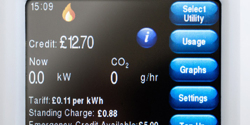

A pilot project by Octavia Housing is helping landlords re-think how they deliver heat and tackle fuel poverty in thousands of social housing properties across the UK supplied by low carbon district heating systems, by allowing them to monitor system performance and energy use in real-time.
The London-based housing association, which owns and manages 4,000 homes, has teamed up with Guru Systems for the project, which will use the company’s metering system to monitor how efficiently the district heating system is working at the flagship Elizabeth House development in Wembley.
The Guru system allows landlords to check that their district heating networks are operating efficiently and that they are charging the right tariff to customers, reducing their financial risk.
It uses wireless technology to monitor key information on how the network is performing – from the central plant right through to each individual’s home – meaning landlords can quickly identify any issues in the network, unlike other monitoring systems which can take weeks to feedback data. Registered providers can identify and focus resources on vulnerable residents in fuel poverty and in immediate need of support.
Eamon Somers, consultant development manager from Octavia, said: “District heating has a significant role to play in the future of social housing and we are delighted to be part of this pilot, which is set to help us provide better services to our tenants, while ensuring that we are operating effectively as a business.
“Many of our tenants are at risk from fuel poverty, and we dedicate a lot of resources to support them. Having real-time information on how our tenants use their heating systems is very valuable. It will mean we can support those most at risk and target support to help more quickly.
The Hub’s colour touch screen provides real-time consumption information to the tenant and also works as a pre-pay device and smart meter, so tenants can top-up via phone, internet, SMS or direct debit.
Every Hub in the building is connected via a wireless ‘mesh’ network to measure heating usage across the block as well as performance of central plant. This information is then sent via the internet to the landlord’s metering and billing provider, Insite Energy, who gets a real-time view of system efficiency.
Charmaine Francis, resident liaison officer at Octavia, said the technology has helped Octavia to think about how improved support can be given to those experiencing fuel poverty. Ms Francis commented: “Since using the Guru system at Elizabeth house, we can see very clearly who is using their heating well and who is struggling. We can then offer advice or signpost tenants to other agencies for support."
District heating networks heat neighbourhoods or residential blocks from a central plant, often using low carbon technologies such as biomass or combined heat and power systems, rather than installing a boiler in every home.
A report by the Department of Energy and Climate Change shows that there are now around 2,000 networks serving approximately 210,000 dwellings and 1700 commercial and public buildings across the UK.
For more information visit www.gurusystems.com
If you'd like to keep up-to-date with the latest developments in the heating and plumbing industry, why not subscribe to our weekly newsletters? Just click the button below and you can ensure all the latest industry news and new product information lands in your inbox every week.